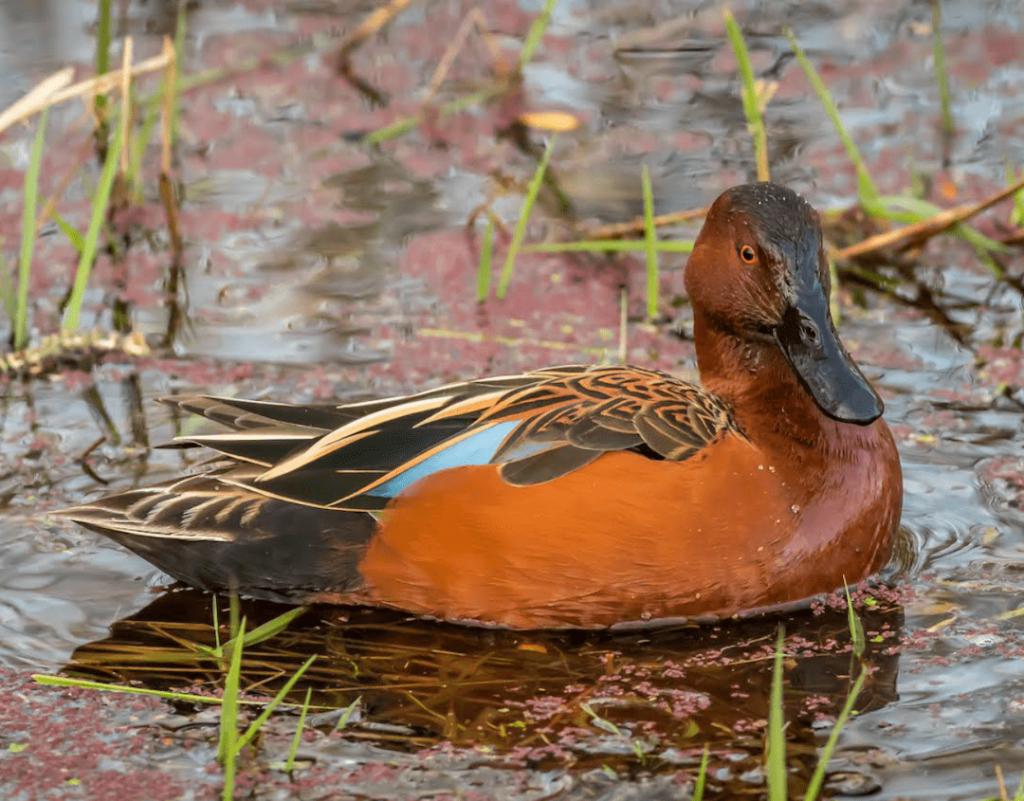‘Banner Year For Conservation Community’: DU On ACE Act Signing
Ducks Unlimited and the Association of Fish and Wildlife Agencies are cheering today’s signing of the “historic” America’s Conservation Enhancement Act, “the most important fish and wildlife legislation enacted this congressional session” in a year that’s been bad for us but fantastic for critters and wildlands.
In an overly divisive time, the bipartisan bill passed through both the US Senate and House of Representatives on voice votes and was signed by President Trump.

Here’s what they’re saying:
Ducks Unlimited
Today, President Trump signed America’s Conservation Enhancement (ACE) Act into law. This bipartisan bill, which affects many important wetland habitat and wildlife conservation programs, was passed by the United States House and Senate with unanimous support in both chambers.

The ACE Act includes several important conservation measures such as reauthorization of the North American Wetlands Conservation Act (NAWCA), the Chesapeake Watershed Investments for Landscape Defense (Chesapeake WILD) Act, reauthorization of the Chesapeake Bay Program and reauthorization of the National Fish and Wildlife Foundation, among other provisions.
“In a year largely defined by doubt and uncertainty, we can also remember 2020 as a banner year for the conservation community,” said DU CEO Adam Putnam. “Coming on the heels of the Great American Outdoors Act, the President’s signature on the ACE Act today represents yet another major victory for conservation achieved by this Congress and this Administration. After an eight-year hiatus, we are especially thrilled to see NAWCA authorized for the first time since 2012. We thank our friends in Congress from both sides of the aisle for coming together and working with DU and our partners to make this critical conservation legislation a top priority for the betterment of waterfowl habitat across the nation.”
NAWCA is a voluntary matching grant program that leverages non-federal and federal funds for wetland restoration. Since enactment in 1989, NAWCA has conserved more than 30 million acres and created an average of 7,500 new jobs annually. Every dollar spent by the federal government, on average, receives a $3 match from program partners like Ducks Unlimited. NAWCA is the nation’s most successful wetlands conservation program. Congressional reauthorization for the program was last passed in 2006 and expired in 2012. The ACE Act reauthorizes NAWCA at $60 million annually until 2025.
The ACE Act could not have been passed by both chambers of Congress without steadfast support from members of the House and Senate on both sides of the aisle. DU owes a special thanks to members of the Migratory Bird Conservation Commission for their year-round commitment to supporting policy priorities that conserve waterfowl habitat. Those members include Sen. Martin Heinrich (NM), Sen. John Boozman (AR), Rep. Mike Thompson (CA), and Rep. Rob Wittman (VA).
“The ACE Act is an important step towards addressing the wildlife crisis. So many of our wildlife species are imperiled—there has been a net loss of nearly three billion birds since 1970—and the impact of climate change on wildlife and habitat is only becoming more severe,” said Sen. Heinrich. “By reauthorizing and increasing funding for NAWCA and creating or extending other conservation programs, the ACE Act will help protect our wildlife and ecosystems. I want to thank the wildlife and conservation groups and advocates, like Ducks Unlimited, who helped generate the momentum to advance this legislation. Together, we are working to ensure our kids and grandkids will be able to hunt, fish, and enjoy our nation’s wildlife for generations to come.”
Sen. Boozman said: “We’ve taken significant action to improve conservation during this Congress, which underscores how broad the consensus is around the necessity of protecting natural resources. As an Arkansan, I’m proud to advocate for federal programs that support our nation’s wetlands and help strengthen waterfowl habitat so we can preserve our rich duck hunting tradition for future generations. The ACE Act will allow us to better implement collaborative strategies to protect and restore habitat and combat the threat of growing wildlife diseases.”
“The Coronavirus pandemic has made people across our nation value their access to public lands and our outdoor recreation spaces more than ever. That’s why I am glad to see the America’s Conservation Enhancement Act signed into law today,” said Rep. Thompson, who wrote the House bill. “This new law will increase access to the outdoors and conserve our wildlife for the next generation and give a financial boost to the communities and businesses around our public lands. Today’s bill signing is a win for our environment, our economy and everyone in our nation who wants to enjoy the outdoors for years to come.”
Rep. Wittman said: “The ACE Act is a terrific advancement to protect and conserve critical migratory bird habitat across America and continue efforts to clean up the Chesapeake Bay. As a passionate waterfowl hunter I am grateful for DU and the continuing legacy of sportsmen lead conservation in our great country and the strides we’ve made in preserving wetlands. The Chesapeake Bay is a national treasure, and the ACE Act provides additional resources and extends conservation programs that preserve wetlands, reduce pollution, and increase recreational opportunities for generations to come.”
DU also thanks Rep. Joe Cunningham (SC) as well as Sen. John Barrasso (WY), Sen. Tom Carper (DE), Rep. Rob Bishop (UT) and Rep. Raul Grijalva (AZ) for their work to guide this important conservation legislation through the Senate Committee on Environment and Public Works and the House Natural Resources Committee.
In addition to NAWCA reauthorization, the ACE Act also creates or reauthorizes other conservation programs that support waterfowl habitat in important wildlife ecosystems across the country.
The Chesapeake Bay is the largest estuary in the United States and, historically, one of the most productive bodies of water in the world. The Chesapeake Bay Program is a unique regional partnership, managed by the Environmental Protection Agency (EPA), whose mission is to reverse the degradation of the bay and restore its watershed and wildlife. The ACE Act reauthorizes appropriations for the Chesapeake Bay Program at $90 million through 2025.
The Chesapeake WILD Act will create a grant program within the U.S. Fish and Wildlife Service to support habitat restoration in the Chesapeake Bay region. In addition, the Secretary of Interior must work with federal, state and local agencies and organizations to identify, prioritize and implement restoration activities within the watershed.
The National Fish and Wildlife Foundation (NFWF) is also reauthorized under the ACE Act. NFWF leverages public funds to raise private dollars that help sustain and restore important wildlife habitat across the nation, including more than 18,600 projects since its creation in 1984.
Association of Fish and Wildlife Agencies
Today, the Association, along with the nation’s hunters, anglers, conservationists, and outdoor enthusiasts of every kind, celebrated the President’s signing of the most important fish and wildlife legislation enacted this congressional session, S. 3051, the America’s Conservation Enhancement Act (ACE Act). The bill ensures continuation of two of the most successful conservation programs in the nation’s history, with reauthorization of the North American Wetlands Conservation Act and codification of the National Fish Habitat Partnership. It provides measures to combat the most pressing disease currently threatening deer species, Chronic Wasting Disease (CWD), through formation of a state and federal Task Force and the direction of research on CWD transmission and pathways. Among other vital provisions, the Chesapeake Bay program is reauthorized, and states are ensured the necessary authority to continue regulating types of fishing tackle based on localized effects for the next five years.
The Association commends Congress for recognizing the impelling need for this bill, which passed both the House and Senate by unanimous consent. The Association extends its deepest gratitude to the members who sponsored this legislation and championed conservation during such a crucial time for the nation’s national resources: Sen. John Barrasso (R-WY), Sen. Thomas Carper (D-DE), Sen. John Boozman (R-AR), Sen. Ben Cardin (D-MD), and Sen. Martin Heinrich (D-NM) as well as Rep. Mike Thompson (D-CA), Rep. Robert Wittman (R-VA), Rep. Joe Cunningham (D-SC), Rep. Debbie Dingell (D-MI), Rep. Marc Veasey (D-TX), and the entire Chesapeake Bay delegation.
“Americans are continuing to utilize public lands and waters in record numbers, many of them for the first time,” said Sara Parker Pauley, Director of the Missouri Department of Conservation and President of the Association of Fish and Wildlife Agencies. “The ACE Act will be indispensable to our natural resources, enabling stewards to ensure our citizens experience the outdoors the way they deserve, with healthy habitats and flourishing species. We thank Congress for recognizing the success and necessity of existing programs while taking steps to address urgent needs such as CWD through this bill.”
“While there is still more work to be done, this has been a landmark Congress,” said Ron Regan, Executive Director of the Association of Fish and Wildlife Agencies. “That the ACE Act stands out as perhaps the most important fish and wildlife bill enacted in the same year as the much needed Great American Outdoors Act speaks to how monumental these provisions are for conservation.”
Once again, the Association would like to thank the sponsors and champions of the Ace Act and looks forward to continuing to work with Congress and the conservation community to secure resources for State Wildlife Action Plans through the Recovering America’s Wildlife Act.
